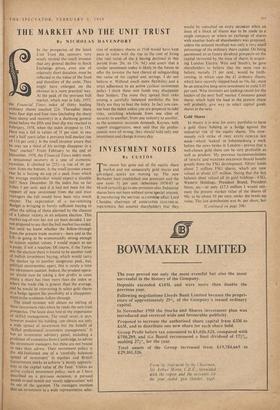THE MARKET AND THE UNIT TRUST
By NICHOLAS
DAVENPORT
IN the prospectus of the latest Unit Trust the sponsors very wisely remind the small investor that any general decline in Stock Exchange prices, even one of relatively short duration, must be reflected in the value of the fund and therefore of the units. They might have enlarged on the obvious in a more practical way. At the peak of the previous bull market, which was in July, 1955, the Financial Times index of thirty leading ordinary shares touched 224. Thereafter there were four dips and four rises (including the sharp Suez slump and recovery) in a declining general trend before the fifth and final dip was reached in February, 1958, when the index dropped to 154. Here was a fall in values of 31 per cent. in two and a half years (after a previous bull market rise of 114 per cent.). Is the small investor aware that he may see a third of his savings disappear in a 'bear' market? From February to the end of December, 1958, the Financial Times index made a sensational recovery in a year of economic recession. It climbed to 2251—a rise of 46 per cent. from the bottom. Is the small investor aware that he is buying on top of a peak from which the average stockbroker would expect a sizeable fall? Since December 28 the index has so far fallen 5 per cent, and if it had not been for the support of new investment from the unit trust managers the fall would have been very much steeper. The expectation of a tax-remitting Budget is bringing in barely sufficient buying to offset the selling of those alarmed by the chances of a Labour victory in an autumn election. This market tug-of-war has not yet been decided. 1 am not prepared to say that the bull market has ended, but until we know whether the follow-through from the present trade recovery—here and in the US—is going, to be economically strong enough to sustain market values, I would expect to see a• pause, if not a reaction. Of course, if the Tories win the election there is bound to be another rush of bullish investment buying, which would carry the market up to another dangerous peak, but, political 'uncertainties apart, this is surely a time for investment caution. Indeed, the prudent opera- tor would now be taking a few profits in cases where a share has risen more than the index or where the trade risk is greater than the average. and he would be reinvesting in select gold shares as a hedge against the possibility of a disappoint- ment in the economic follow-through.
The small investor will obtain no inkling of these investment risks when he reads the unit trust prospectus. The latest does hint at the importance of skilled management. The small saver,. it says. however modest his holding, can obtain not only a wide spread of investment but the benefit of skilled professional investment management.' it has an investment advisory panel, including a professor of economics from Cambridge, to advise the investment managers, but these are not hound to take their advice. Their investment policy is the old-fashioned one of a 'carefully balanced spread of investment' in equities and British Government stocks to achieve 'a steady apprecia- tion in the capital value of the fund.' Unless an active cyclical investment policy, such as I have described on a previous occasion, is pursued month in and month out 'steady appreciation' will be out of the question. The managers mention that an investment in a wide representative selcc- tion of ordinary shares in 1948 would have kept pace in value with the rise in the cost of living (the real value of the having declined in this period from 20s. to I 3s. 9d.) and assert that a similar investment today is likely in the future to offer the investor the best chance of safeguarding the .value of his capital and savings. I do not believe it. Without much more flexibility and a strict adherence to an active cyclical investment policy 1 think these unit funds may disappoint their holders. The more they spread their risks among a carefully balanced portfolio the less likely arc they to beat the index. In fact you can- not beat the index unless you are prepared to take risks, switching wholesale from one class of security to another, from one industry to another, as the economic occasion demands. Keynes, with superb exaggeration, once said that the profes- sionals were all wrong; they should hold only one investment and change it every day.






































 Previous page
Previous page